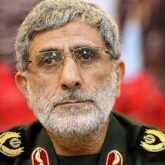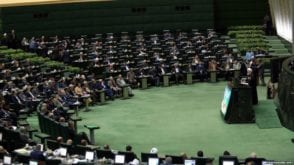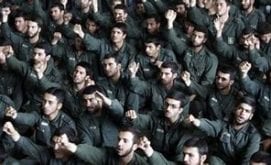Al-Arabia – The United Kingdom’s message to its regional allies in the Gulf region, as well as its European and North American partners, is that the world cannot afford to see Iran acquire nuclear weapons, British Foreign Secretary Dominic Raab said in a special interview with Al Arabiya’s London Bureau Chief Rima Maktabi.
https://vid.alarabiya.net/2020/03/09/raab99252ade/raab99252ade___raab99252ade_video.mp4
“We want to see Iran come back into compliance with its obligations, but we will hold Iran to account when it systematically flouts the basic rules of international law or the deal that it’s done,” Raab told Al Arabiya after his recent official trip to Saud Arabia.
Read more: Britain’s foreign minister visits Oman, Saudi Arabia to boost post-Brexit ties
“And I think that it’s really important that we work closely with our partners in the region but also that the Europeans and the North Americans give a very clear message on this: We cannot afford to see Iran acquiring nuclear weapons,” he said during the interview.
During the wide-ranging interview, Raab also spoke on the future of British-Saudi Arabian relations and trade, emphasizing the shared common interests between the two countries.
“I wanted to hear about Vision 2030 in Saudi Arabia. So there is an opportunity for win-win across the commercial sphere. There are also huge range of security issues we have in common. We discussed the opportunity in 2020 to resolve the conflict in Yemen,” Raab said.
Here is the full transcript of Al Arabiya’s special interview with Raab:
Al Arabiya’s Rima Maktabi: Hello and welcome to this interview with the British Foreign Minister Dominic Raab. Thank you for this interview.
British FM Dominic Raab: My pleasure, Thank you.
Al Arabiya: So, you just came back from Saudi Arabia, and a tour to the GCC – what was that about and what did you discuss with the Saudi leadership?
Raab: Well we’ve left the EU now, so we’ve got huge opportunities to engage more liberally on free trade with countries around the world. Saudi Arabia, Oman and Turkey were three of the countries I visited. Both… All three of those very strategically important. So, there is an opportunity now for the United Kingdom to focus on those parts of the world which are increasingly strategic important for the future. We’re not leaving aside our strong friendships with our European partners and neighbors but we do want to invest more time and energy in these other parts of the world where we have underlying relations but we can actually nurture them even more now.
Al Arabiya: And when you say that… what are you talking about? Tech, trade relations… What exactly, which sectors does the UK specifically care about?
Raab: Well we obviously got a big services sector, we got strong financial services but also for example, in the countries of the Gulf there are great opportunities for British universities. So right across the board I think there are some really exciting prospects for win-win deepening of trade investments. And also, of course, we wanted to hear about what the new sultan of Oman was saying about Vision 2040 for his country. I wanted to hear about Vision 2030 in Saudi Arabia. So there is an opportunity for win-win across the commercial sphere. There are also huge range of security issues we have in common, we discussed the opportunity in 2020 to resolve the conflict in Yemen. There was, as you could probably imagine, a lot of discussion about the threat from Iran. And in all of these areas beyond the trade and economics sphere, I think there are important opportunities to deepen our cooperation.
Al Arabiya: Let’s talk about Iran: what will you do if Iran continues to breach the international community’s guidelines regarding its nuclear activities? It’s been stockpiling on nuclear (low?) and rich uranium, so… over the past three months – what will you do about that?
Raab: Well in at the start of the year responding to systematic, Iranian non-compliance. The E3 as we then refer to ourselves, the UK, France and Germany triggered the dispute resolution mechanism for the JCPOA, the nuclear deal, we want to leverage back into the diplomacy, we want to see Iran come back into compliance with its obligations, but we will hold Iran to account when it systematically flouts the basic rules of international law or the deal that its done – as is the case in the nuclear file. And I think that it’s really important that we work closely with our partners in the region but also that the Europeans and the North Americans give a very clear message on this: we cannot afford to see Iran acquiring nuclear weapons.
Al Arabiya: Ok. But the international community has been saying this for years, and Iran at this speed, could be one year away from a nuclear bomb. Is military actions on the table to stop Iran from acquiring a nuclear bomb?
Raab: Well, I think the first thing is to de-escalate the situation, the tension is very, very high, we’ve seen that since the start of the year. We want to deescalate those tensions but we do see it’s absolutely vital to show the resolve that we intend to hold iran to account for its unlawful behavior. That’s true in the nuclear context in relation to the nuclear deal and that’s why we triggered this dispute regulation mechanism. We still believe the JCPOA can be made to work, equally we would like to go further and be more ambitious . The ultimate decision will lie with regime in Tehran. And whether its on their destabilizing activities from support for Hezbollah through to their actions in Syria and Iraq, whether it’s on the nuclear file, whether it’s on the harrying of shipping in the Strait of Hormuz or indeed the treatment of dual nationals, and obviously British dual nationals. We will hold Iran to account but at all times we would like to see the door left open for Iran to do the right thing, come back to the negotiating table and build confidence in that it’s actually a responsible member for the international community.
Al Arabiya: So post-Brexit, are we talking about the UK that’s foreign policies is closer to the EU foreign policy of the American foreign policy when it comes to foreign affairs like Iran, like Yemen, like the rest of the topics?
Raab: Well I think the chart and independence falls but I think we will stay close to our European, and our American allies, the concept of global Britain of course involves deepening our relationships with our European partners, we were talking about, we are negotiating a free trade agreement so we want to stay close = the cooperation that we have on things like coronavirus, Iran Libya will continue, I’ll keep talking to all of my colleague particularly my French and German obviously my numbers because we’ve had this E3 form in the past. We’ll continue talking in that context. We also, though, want to engage more liberally and energetically in free trade negotiations with other countries around the world. You mentioned the united states, but actually there are other huge opportunities in the middle east and indeed in asia pacific. And at the same time, I think you will see, very important this government and our country as a whole and as Prime Minister, to see britain as a really strong force for good in the world and that’s everything from hosting the UN climate change talks in November, to our campaign to make sure every young girl in the world has a quality of education for 12 years. So in all of those areas, I think you’ll see a more active United Kingdom.
Al Arabiya: You must have discussed Yemen with GCC countries within your tour. What can the UK do about Yemen, and help all the warring parties to stop this war?
Raab: We certainly support the UN track, we want to see de-escalation. We want to see a political resolution of the conflict in Yemen. I discussed it with the new sultan in Oman, I’ve discussed it with his Royal Highness King of Saudi Arabia and indeed the foreign minister and number of other inconnocutors. There is now an opportunity, we think in Yemen, to resolve the conflict and to give the people of Yemen the prospects of a brighter future and that will require pressure on the Houthis but also compromises by all parties in order to navigate our way forward. And of course, we’re supporting the UN special envoys and all his efforts in the region.
Al Arabiya: Syria has witnessed bloody escalation over the past weeks. Thousands of refugees are at the doorsteps of Europe, and it’s all about Turkey and Russia on Syrian soil. What does the UK say about that?
Raab: Well I don’t … With respect to Greece, I think the fundamental cause of this crisis and conflict, including the humanitarian situation, is the actions of the regime in Damascus but you’re right, they’ve been irresponsibly supported by the Russian government. So we would like to see, and we’re pleased to see, that there is a ceasefire in Idlib. It’s important now to try and build on that and make it a permanent truce, a permanent ceasefire and then chalk, of course, back to a peaceful resolution of the conflict. But the, let’s also be very clear that whether it’s the loss of life, the humanitarian crisis, or indeed the refugee crisis, this results from the actions and the cruelty of the regime in Damascus – and that must come to an end.
Al Arabiya: And what about the refugees that we’re seeing very hurtful images in Greece, and the UK is nearly a part of the EU now, at least within the certain guidelines before the end of 2020. What about those refugees, what do you say about them?
Raab: Well we say that international law must apply. First and foremost, we want to bring an end to the cause of the conflict which is the regime in Damascus: the cruel approach that its taken and indeed, backed by the Russian government and the Russian military. At the same time we, of course, want the principles in international law to be respected. We work with our Turkish NATO allies but also our European partners to make sure that that’s achieved.
Al Arabiya: Now let’s discuss corona. Topic number one. On a personal note, have you cut down on your travel… has your life changed as a foreign minister after the coronavirus?
Raab: I wouldn’t say it’s really changed. We’ve… I’ve been to Asia Pacific recently and now I’ve been to the Middle East, but of course, were looking very carefully and actually engaged with all of the countries that I’ve just… in the regions that I’ve just mentioned to make sure that we’ve got a good understanding of the health measures that they’re taking and our approach domestically and internationally is just to be guided by the science. We want to take sensible decisions to contain and prevent the spread of the virus and also of course to counter UK nationals, if they find themselves stranded.
Al Arabiya: And will the foreign office or the UK government advice against certain flights coming in from the Middle East, like Lebanon or other countries? I know that there are no direct flights with Iran now, but like… Lebanon or other countries?
Raab: Well the guidance that the government gives is through our foreign affairs travel advice, we keep that under regular review and its changed at various points over the last few weeks. But again, we want to be guided by the science, because ultimately, we recognize the economic damage as well as the public health implications. So, we’re going to be guided by the science, guided by the medical advice we get, particularly from the Chief Medical Officer in the department of health and social care.
Al Arabiya: But that’s minute by minute, right? It might change within the coming weeks?
Raab: Well all travel advice is kept under review. So that’s something that I look out regularly, but in relation to coronavirus, we want to be guided by the science.Last Update: Tuesday, 10 March 2020 KSA 08:29 – GMT 05:29
 Shabtabnews In this dark night, I have lost my way – Arise from a corner, oh you the star of guidance.
Shabtabnews In this dark night, I have lost my way – Arise from a corner, oh you the star of guidance.


